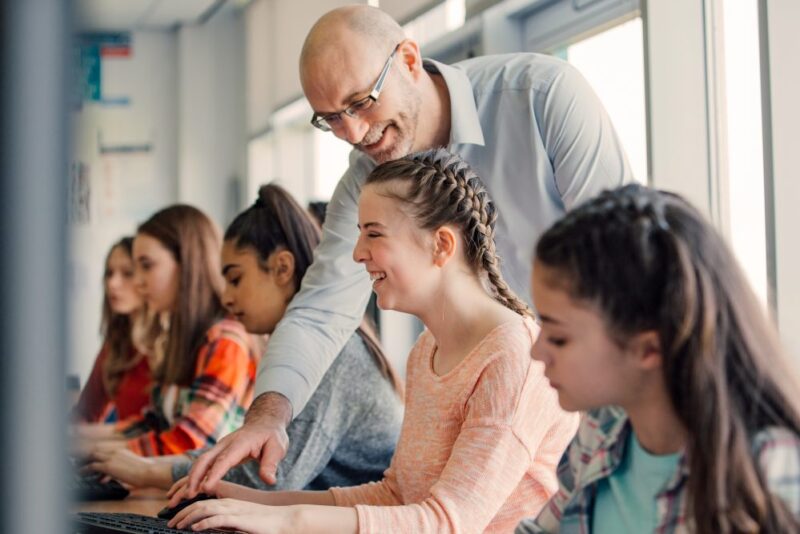How to make the internet a reliable source of information for students
Ask any millennial who braved High School around the end of the 20th century about research projects and they’re likely to recall the typical stipulation where teachers and students limited their use of online research materials. The internet was still relatively new, and as a result was treated by many educators with either extreme reluctance or cautious optimism. These educators weren’t wrong to be wary. After all, this was a medium through which literally anyone with an internet connection could post information and claim that it was legitimate. In the world of media, the pressure of competition forces news sites to provide fast information not necessarily accurate information.
However, the world wide web has changed dramatically in just a short period of time, and is now host to a wide variety of reliable sources, including online digital textbooks like Kognity. Having said that, not all information online is reliable or relevant, and therefore it is important to teach students proper research skills.
Vet Your Sources
There are easily as many illegitimate or questionable sources on the internet as there are legitimate ones. What’s more, not all information that can be found on an otherwise reliable website is itself reliable. Teach your students to discern between “good” and “bad” information by asking the right questions.
First, have them assess the quality of the source. Who am I getting this information from? What do I know about them? What credentials do they have for being an authority on this subject? What reputation do they have (if any)? Encourage students to read any “about us” or similar information the website may provide or even run an internet search on the organisation to see what others have to say. Next, have your students pay close attention to the date of the article. This is especially important when researching current events.
The IB has always sought to create learners who learn autonomously and think critically. The skill of critical thinking is being developed through a number of channels throughout the IB such as in History where students are required to critically assess the reliability of sources. The IB also uses one of its compulsory courses Theory of Knowledge (TOK) to teach students about how they acquire information. It is these skills that students can apply when they are vetting sources to see their legitimacy.
Corroborate the Information
Encourage your students to always check facts and other claims they find while gathering information online. Have them look for one or two more trusted sources that support that claim. It’s very important that the sources are legitimate. There is an unfortunate market out there for articles that have been written and rewritten for numerous sites, making it easy for misinformation to be propagated throughout the web. Legitimate sources are less likely to purchase churned content and will, therefore, be more reliable.
Follow up on References
If your students encounter articles that contain external links to other sources or, even better, a list of references at the bottom, encourage them to follow those trails. Not only is this a quick and easy way to check facts, but it is also a helpful way to locate other legitimate sources that could provide more helpful information. You might even encourage them to check out relevant Wikipedia pages and explore the wealth of references at the bottom of each one. Many link to scholarly articles or primary source documents.
Learn How to Search
Your students have grown up in the 21st Century. Of course they know how to Google something, right? In truth, most students are likely to just plug their topic into the search engine window and hit enter. In fact, most people don’t realise how nuanced an internet search can be.
Teach them to refine their searches to reach higher quality sources and more relevant information. For example, if your student is writing a research paper on Martin Luther King, Jr. and he writes “Martin Luther King, Jr.” into the search engine field, his results will be overwhelmingly varied. However, if he takes some time to organise his thoughts and focus on certain aspects of King’s life, he may have more success. Searching for “I Have a Dream” or “Martin Luther King Assassination” is far more likely to yield relevant information. If it helps, have students make a list of key search words and phrases before they get started.
Teach them to use advanced searching features for engines like Google or Yahoo. These features will allow students to search for content within specific websites or time frames, guaranteeing that they receive more relevant and reliable information. They can also learn to omit certain words.
Remember: This is Not Just About Convenience
Some educators and parents are still resistant to the idea of the internet as a primary research tool. In truth, the internet brings the world to our living rooms and acts as a great supplement to books such as a encyclopaedias. In no other age, even twenty years ago, could a teenager sit in their living room and find scanned copies of actual historical documents.
Ultimately, IB students around the world are being encouraged to use a variety of resources throughout their IB studies. It isn’t about just using a textbook or the internet exclusively but rather an opportunity to use a number of different resources to gain a wealth of information. This access to vast amounts of information and resources has given students of the 21st century the opportunity to delve deeper in their research and made resources more accessible which alone has pedagogical and cultural value. As long as we are teaching students the skills to critically assess the information they find, then we are producing students who are critical thinkers and able to truly assess the reliability of an online source.
How do you teach your students to use online resources? Let us know in the comments.

